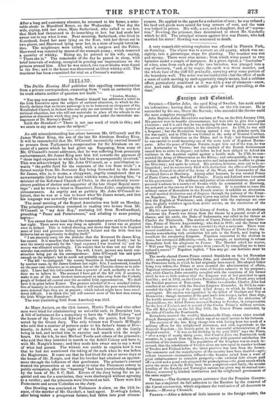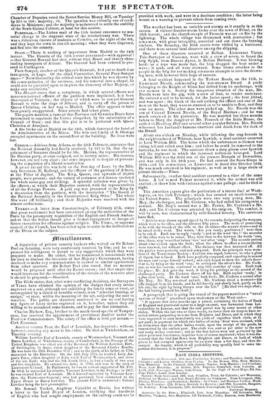ffortign ana
SWEDEN.—Charles John, the aged King of Sweden, has sunk under his infirmities ; having died, at Stockholm, on the 8th instant. He is succeeded by his son, Oscar the Second; who ascended the throne amid the most complete tranquillity.
John Baptiste Julius Bernadotte was born at Pau, on the 26th January 1764. His parents were in humble circumstances, but were able to give him a good education ; and it is said that he was studying for the bar when he entered the French army as a private soldier, in his sixteenth year. In 1789, he was still a Sergeant ; but the Revolution having opened a way to plebeian merit, his rise was rapid ; and in 1792 he was Colonel in the army of General Custines- He served with distinction on the Rhine, and in Italy : but throughout life,
he was careful to avoid becoming one of the mere tools of Napoleon Burmaparte. After the peace of Campo Formio, to get him out of the way, he was
sent Ambassador to Vienna; but the conduct of the French Government caused him to retire in disgust; not before he had been obliged to defend his residence in the Austrian capital against a hostile mob. In 1799, he com- manded the Army of Observation on the Rhine ; and subsequently, he was ap- pointed Minister of War. He was too active and independent in office to please the Directory; and again he retired. His services, however, were not to be re- linquished; and he successively filled with distinction the Officea of Councillor of State, General-in-chief of the Army of the West, and Commander of the combined forces at Hamburg. Among other honours, he was created Prince of Ponte Corvo, and a Marshal of France. Fionia and Jutland were intrusted to his government. The mildness and justice of his administration, and some personal kindness to a number of Swedes while he commanded at Hamburg, are assigned as the causes of his future elevation. It is needless to trace the military career of Bernadotte in the French armies: it exhibits an alternation. of well-merited distinction and of disgrace. through the jealousy of the Empe- ror Napoleon. The Prince of Ponte Corvo was called from retirement to at- tack the English at Wakberen ; and, disgusted with the espionage set over him, he gladly withdrew again from active service, on the conclusion of the peace with Austria. His life now becomes part of the history of Sweden. In 1809, the madman Gustavus the Fourth was driven from the throne by a general revolt of all classes; and his uncle, the Duke of Sudermania, was called to the throne as Charles the Thirteenth. The station of Crown Prince devolved upon Chris- tian, Prince of Sleswic Augustenberg; who died in 1810; and the throne was left without an heir. A Diet was convoke] to elect a successor. There were several candidates; but the choice fell upon the Prince of Ponte Corvo ; the Swedes remembering with satisfaction his rule in the North, and hoping to conciliate the conquering Emperor. Napoleon consented to the election is
terms, but interposed difficulties,—such, for example, as hesitating to release
Bernadotte from his allegiance to France. The Marshal asked, his master, " Will your Majesty make me greater than yourself, by compelling me to have refused a crown? " Napoleon replied, " You may go: our destinies must Ixt fulfilled."
The newly-elected Crown Prince entered Stockholm on the 1st November 1810 ; assuming the name of Charles John, and abandoning the Catholic for the Protestant faith, in which he had originally been reared. His adopted father bring very infirm, the Prince at once assumed the administration of affairs- Napoleon endeavoured to make the ruler of Sweden subserve to his purposes ; but, while Charles John ostensibly complied with the exactions of his former chief, he was so little zealous that the Emperor was at last provoked to open hostility ; and in 1812, on the Crown Prince's birthday, the French army seized. the Swedish province of Pomerania. Within two months, Charles John had concluded an alliance with the Russian Emperor Alexander. In 1813, be com- manded the right wing of the grand Allied Army; to which he furnished a contingent. His success was signalized by the defeat of Oudinot and Ney at Dennewitz ; though memories of the past made him temper, rather than urge, the hostile measures of the Allies towards France. After the abdication of Fontainbleau, the Allied Powers annexed Norway to Sweden, in compensation. for the loss of Finland, and in reward of the Crown Prince's military services. The old King dying on the 5th May 1818, the Crown Prince succeeded, by the title of Charles the Fourteenth.
Bernadotte married the wealthy Mademoiselle Clary, whose sister married. Joseph Buonaparte ; an alliance which was of no small service to his fortunes.. The enemies of the late King charge him with having been too much of military officer for the enlightened statesman, and with ingratitude to the Emperor Napoleon ; his friends point to his successful administration of his adopted country. " It was on his birthday in the year 1840," says the Times, " after a reign of nearly thirty years, that Charles John the Fourteenth took occasion, in a speech from the throne, to survey with parental satisfaction the condition of his dominions. The population of the kingdom was so much in- creased, that the inhabitants of Sweden alone are now equal in number to those. of Sweden and Finland before the latter province was torn from the former. The commerce and the manufactures of the country have been doubled—agri- culture improved—instruction diffused—the finances raised from a state of great embarrassment to complete prosperity—the national debt almost paid off—a civil and a penal code proposed for promulgation—the great canals which. unite the ocean with the Baltic have been completed—and lastly, the secular hostility of the Swedish and Norwegian nations has given way to mutual con- fidence, cemented by kindred institutions and the enlightened government of the same sceptre."
PRUSSIA.—The German papers announce that the Prussian Govern- ment has completed its full adhesion to the Russian by the renewal of the Cartel convention, which stipulates the restitution of all deserters to Russia.—Morning Chronicle. FRANCE.—After a debate of little interest to the foreign reader, the
Chamber of Deputies voted the Secret Service Money Bill, on Tuesday' by 225 to 169 ; majority, 56. The question was virtually one of confi- dence in Ministers ; and the majority is understood to settle the stability of the Soult-Guizot Cabinet, at least for this session.
Poleranaa..—The Lisbon mail of the 13th instant announces no ma- terial change in the stagnant state of the revolutionary war. There was a ridiculous emeute of students at Coimbra, on the night of the 8th, and they kept the town in riot till morning; when they were dispersed, and fled into the country.
Sparza.—There is nothing of importance from Madrid to the 14th instant. The Gazette of the 12th instant announced—with approval ! —that General Roncali had shot, without trial, Bonet and twenty-three leading insurgents of Alicant. The General had been ordered to pro- ceed to Carthagena. Puez-Samper, another of the Queen's Generals, had put to death four insurgents, at Lugo. Of the chief, Castravilar, General Puez-Samper says—" Notwithstanding the critical state into which he was thrown by the communication of the sentence, and his removal into a chapel, be could not be prevailed upon to implore the clemency of her Majesty, or make any revelations."
The lieraldo states that a conspiracy, in which several officers and noncommissioned officers of the garrison were implicated, hod been discovered at 'Valencia ; the objects of which were to compel General Roncali to raise the siege of Alicant, and to carry off the person of Queen Christina, on her way to Madrid. The affair appears to have been greatly exaggerated. Some arrests had taken place.
The papers mention a rumour that Narvaez and Gonzalez Bravo have determined to supersede the Cortes altogether, by the substitution of a Council of State ; and that this plot is to be perfected with Queen Christina at Aranjuez.
A fire broke out at Madrid on the 12th, which destroyed the hotel of the Administration of the Mines. The wife and family of S. Olozaga occupied apartments on the second floor of the building. No lives were lost.
GREECE.—Advises from Athens, to the 29th February, announce that the National Assembly had finally resolved, by Ill to 92, that the ap- pointment of Senators should be for life. Metaxa, the representative of the Russian party, at once resigned, not to destroy union. His reasons, however, are not very clear ; and some impute it to despair of prevent- ing the completion of a liberal constitution. A grand annual fete was held on the first day of Lent, by the Mili- tary Governor, M. Kallergi, and the officers of the garrison of Athens, at the Pillar of Jupiter. The King, Queen, and upwards of 20,000 people, were present ; and the variety of costumes and dances rendered the whole scene gay and striking. A splendid collation was given by the officers ; at which their Majesties assisted, with the representatives of all the Foreign Powers. A gold cup was presented to the King by a deputation from the garrison, with the inscription " The Guard of the National Assembly to the Constitutional King Otho." The whole Qte went off brilliantly ; and their Majesties were received with the utmost enthusiasm.
TURKEY.—A letter from Constantinople, of February 27th, states that great excitement bad been occasioned among the authorities of the Porte by the peremptory requisition of the English and French Ambas- sadors that the Sultan should give a formal engagement to forego all future executions for offences against religion. The Ulema, or supreme council of the Church, has been called upon to assist in the deliberations of the Divan on the subject.



























 Previous page
Previous page